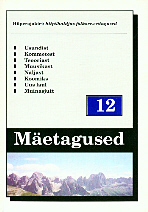"Ambroosius on ladna mees..." Ühest jõuluteemalisest külalaulust
"Ambrose is a great fellow..."' On a village song on Christmas theme
Author(s): Anu VisselSubject(s): Customs / Folklore
Published by: Eesti Kirjandusmuuseum
Summary/Abstract: For the Estonians the word «Christmas carol» denotes an authorial song, primarily a children's song or a hymn. Christmas songs are extremely rare among the old alliterative songs (runosongs). It seems to be typical to the old pre-Christian winter equinoctial customs that they are not very closely associated with calendrical songs. Several Christmas songs might be found among the more recent rhymed folk songs, which describe some local Christmas party or some other events during the Christmas period. Usually, they are long cheerful narratives which mention nothing of the holiday's Christian origin. One of such songs is «Ambroosiuse laul» (The Song of Ambrose) from the vicinity of Torma. The song was created during the 1860s in Torma, Tartumaa region, and has gone through several stages: first a village song, then a popular song, and for the longest period a student song. The author of the song ingeniously hit the nail on the head using a family name that coincides with a name of the Italian bishop and saint, so, the song is about a generous and altruistic innkeeper called Ambrose. The song was inspired by an event that took place imminently before the Christmas. A tired soldier in rugs, who had just been released from a 25-year military service in the Tsarist Russia, had arrived at the stage of Torma. The innkeeper had given him shelter, food and clothes until the soldier went to search for his sister. The old soldier expressed his gratitude by washing all the inn floors on the morning of Christmas eve, and even brought a fine Christmas tree from the forest. In the evening, a party was held at the inn, where a local singer, violin player and comic Kristjan Kivi sang a song about it. The song describes the Christmas party as seen by the poor old soldier, who could take part of the party among the local crème thanks to the kindness of innkeeper. The song began to circulate in Estonia from the Christmas of the 1860s on. Soon the song was spread through oral renditions and songbooks all over Estonia (see map 1).The song retained its original melody only in its place of «birth» (note samples 1 and 2, audio sample 1), in further distribution it has been sung to various tunes and with different refrains from its original area (samples 4 and 5) and from other regions of Estonia (sample 7, audio sample 3), but is best known with the tune of a well-known German student song Krambambuli (Krambambuli, das ist der Titel...) (note samples 3 and 6. audio sample 2). Refrains were added to the song mostly in oral performing, while the printed versions, like the first text of the song published in 1878, were mostly without refrains (Table 1).
Journal: Mäetagused. Hüperajakiri
- Issue Year: 1999
- Issue No: 12
- Page Range: 96-116
- Page Count: 21
- Language: Estonian

